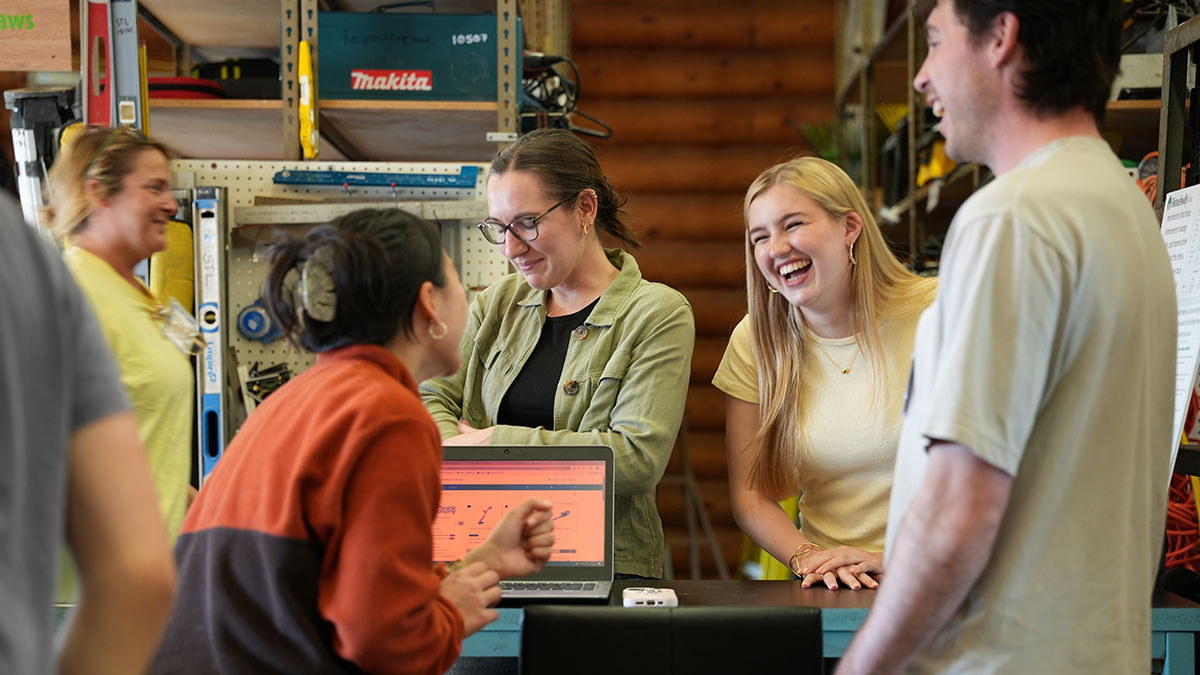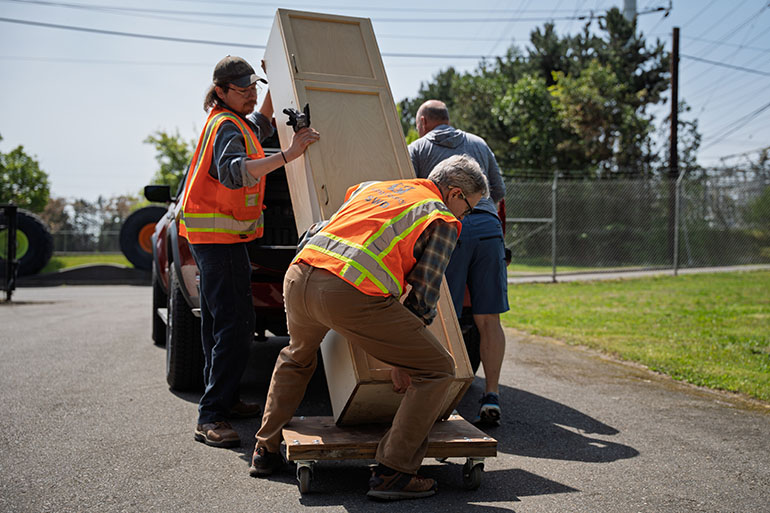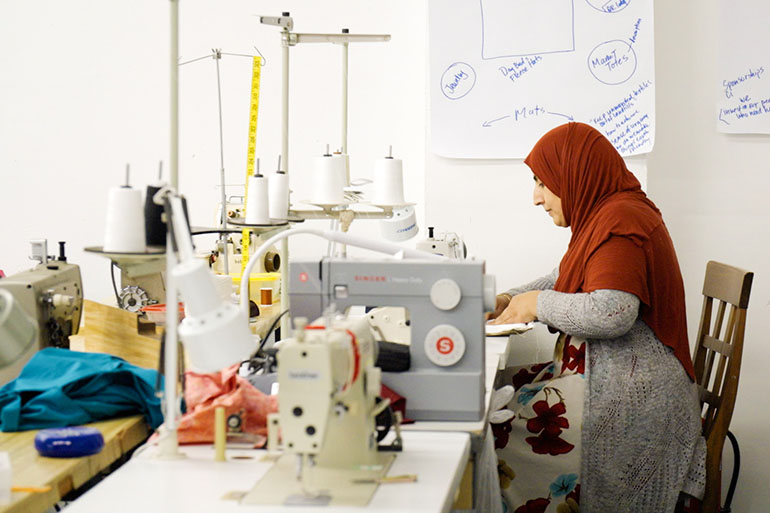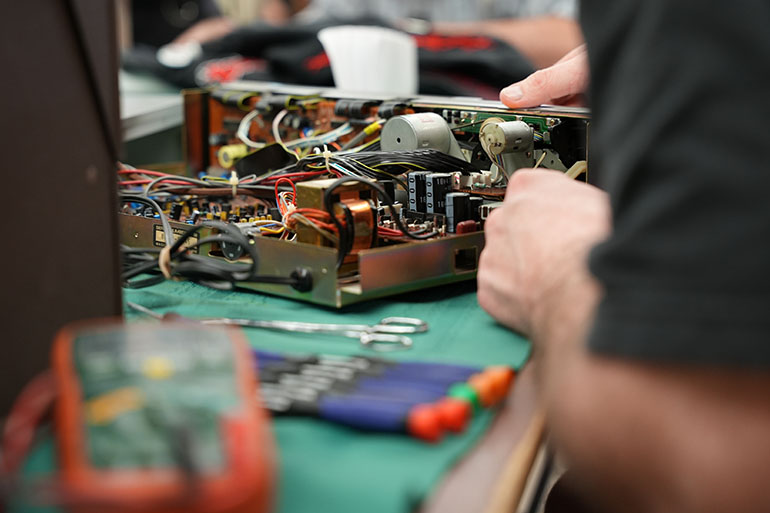Executive Braddock announces $2.17 million in Re+ grants that will help small businesses and nonprofits reduce waste and cut greenhouse gas emissions
Summary
Sept. 3, 2025: Small businesses and nonprofits will receive a combined $2.17 million in grant funding to reduce waste and cut greenhouse gas emissions, advancing King County’s Re+ initiative.

News
King County Executive Shannon Braddock today announced a combined $2.17 million in grant funding for 14 projects that will reduce waste and keep valuable resources in the economy and out of the landfill. Each project contributes to Re+, King County’s initiative to significantly cut greenhouse gas emissions by transitioning to a sustainable circular economy.
Nearly half of the projects will reduce food waste by collecting unused crops from local farms for culinary training and free meals, reducing waste generated from events, and converting food waste into organic fertilizer for local farmers. Several other projects will make construction more sustainable by converting plastics into 2x4 beams for decking and benches, expanding lumber recovery, and increasing access to a popular tool library.
King County's Solid Waste Division administers the Re+ Circular Economy Grants.

“Small businesses and nonprofits throughout King County are already delivering measurable progress in reducing their waste and cutting greenhouse gas emissions,” said Executive Braddock. “Our Re+ grants increase their capacity so they can accelerate their efforts, helping our region transition to a sustainable, circular economy.”
While King County has achieved one of the nation’s highest recycling rates, nearly 70% of the materials brought to the Cedar Hills Regional Landfill in Maple Valley could be reused, recycled, or composted, rather than buried as waste that generates greenhouse gas emissions. Re+ is focused on diverting waste from the landfill, creating more green jobs, and ensuring everyone in King County has equal access to efficient recycling and waste services.

Businesses and households in King County annually throw out enough edible food to feed roughly 92,000 people – about the population of Kirkland – for an entire year. Food production requires large amounts of resources while creating significant greenhouse gas emissions. When food ends up at the landfill, it generates methane – a particularly potent greenhouse gas – as it breaks down.
This year’s Re+ Circular Economy Grant recipients are:
- Chomp Energy: Convert commercial food waste into a concentrated liquid and solid biofertilizer for local farms.
- Sustainable Renton: Increase efforts to rescue surplus edible food and minimize organic waste in south King County.
- Project Feast: Rescue surplus crops from local farms to support culinary training for immigrants and refugees and provide free meals to food-insecure residents.
- Franciscan Foundation: Reduce food waste at three hospitals in King County by diverting edible food and providing nourishing meals to local communities in need.
- Earthwise Architectural Salvage: Expand lumber recovery and reuse by collecting and processing salvaged lumber and offering educational workshops and free lumber to frontline communities.
- Second Use Building Materials: Establish and operate a drop-off site at the Shoreline Recycling and Transfer station for reusable items such as building materials, furniture and fixtures.
- Refugee Artisan Initiative: Employ refugee women artisans to design and craft new products using repurposed vinyl billboards, coffee bags and other upcycled materials, increasing reuse, and providing critical employment opportunities.
- Perennial Zero Waste (Human Eco Consulting): Reduce waste by providing reusable food service ware, an on-site mobile dishwashing trailer, and full compost and recycle waste management services at events in King County.
- Remakery: Expand plastic recycling program by turning plastic into 2x4 beams and other durable goods for outdoor uses, such as decking and benches.
- Zero Waste Washington: Reduce waste from milk cartons, milk, and single-use plastic bottles in K-12 school cafeterias by shifting to more sustainable milk and water dispensers.
- Farmstand Local Foods: Pilot a reusable bin program with farmers and customers to replace disposable boxes for produce storage, transport, and distribution.
- Furniture Repair Bank: Expand efforts to repair and refurbish furniture and provide it to refugee and low-income families.
- Seattle REconomy: Expand on the successful launch of the Shoreline Tool Library, a single location that houses a tool library, reclaimed materials store, and educational space.
- Seattle ReCreative: Expand material reuse efforts beyond Seattle, increasing access to creative reuse, diverting usable materials from the landfill, and inspiring community-based reuse centers.
This is the second round of Re+ Circular Economy Grants awarded by the Solid Waste Division, some of which will expand on successes from the initial grants announced in 2024.

“The Circular Economy grants will help these 14 dynamic projects grow so they can sustainably operate into the future,” said Rebecca Singer, King County Solid Waste Division Director. “Supporting local organizations helps us reimagine our waste system in a way that is equitable and builds community.”
Re+ contributes to King County’s Strategic Climate Action Plan, which unites King County and community partners to reduce emissions, increase resilience, and prepare for climate impacts.
"Community partnership is key to achieving the ambitious targets in our Strategic Climate Action Plan,” said King County Climate Director Marissa Aho. “We’re excited to see how these grants support local action and help make innovative solutions a reality.”
King County’s Solid Waste Division is one of four divisions at the Department of Natural Resources and Parks.
Multimedia
- PHOTO GALLERY: Images of Re+ grant recipients available to download
- TRACKS: An interactive map of environmental stewardship in King County
Resources
Quotes
Small businesses and nonprofits throughout King County are already delivering measurable progress in reducing their waste and cutting greenhouse gas emissions. Our Re+ grants increase their capacity so they can accelerate their efforts, helping our region transition to a sustainable, circular economy.
Community partnership is key to achieving the ambitious targets in our Strategic Climate Action Plan. We’re excited to see how these grants support local action and help make innovative solutions a reality.
King County’s Re+ Grants have been life changing for the Shoreline Tool Library. The Circular Economy grant has helped us scale up our operation by purchasing a van to collect and deliver materials and allowing us to increase our staffing capacity so we can stay open longer and more consistent hours. These changes have allowed us to foster partnerships and build a reliable customer base in the community. Perhaps most important, we used grant funds to hire a consultant to develop a long-term fundraising strategy, which will help us diversify our revenue sources, making us more sustainable in the long term.
The Re+ grant has been transformative for Furniture Repair Bank. It expanded our capacity to provide a unique and much-needed service to King County residents, while also demonstrating what furniture can be restored and brought back into circulation. This means we’re helping communities not only prevent valuable items from going to waste but also place restored furniture into the homes of neighbors who need it most. The grant has truly helped our organization strengthen our first-of-its-kind model and set a precedent for furniture waste diversion.
The Circular Economy grants will help these 14 dynamic projects grow so they can sustainably operate into the future. Supporting local organizations helps us reimagine our waste system in a way that is equitable and builds community.
Contact
Joe Basile, Solid Waste Division, 206-848-0496
Visit our Newsroom for additional resources
 Translate
Translate